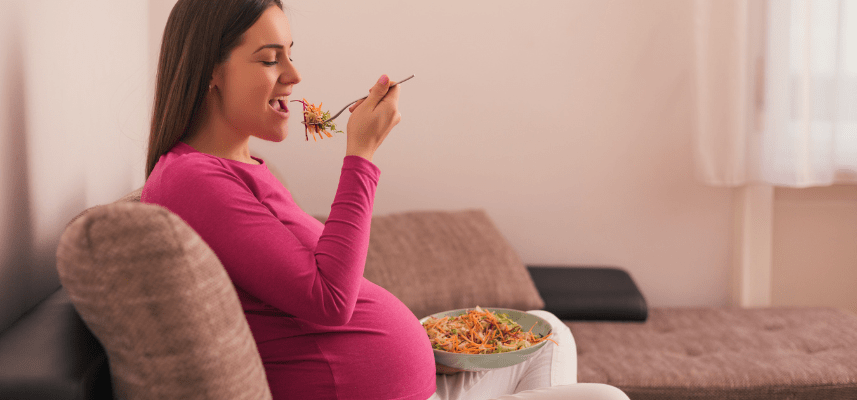There is nothing easy about having a newborn baby. Being a new mom is hard, no matter how “easy” others around you (or those you might see on the internet) make it look. The postpartum period is one of the most physically, mentally, and emotionally challenging periods of a woman’s life. The physical recovery from having a baby can take several months and it’s normal for new mothers to experience pain, bleeding, and digestive problems, just to name a few.
It’s not unusual to have unrealistic expectations for the realities of postpartum life and what it’s like to be a new mom. There is such an emphasis on planning for your baby’s needs while pregnant, that mothers often neglect their own needs and don’t consider themselves to be important. This can quickly lead to intense anxiety and stress, and can be detrimental to maternal mental health.
What is Postpartum Depression?
Postpartum depression (PPD) is one of several postpartum mental health conditions. It is characterized by a lasting, severe period of sadness or hopelessness following the birth of your baby, most commonly occurring within the first six weeks postpartum. It is sometimes referred to as “peripartum depression” because, in some mothers, symptoms of depression can present during pregnancy as well.
It is important to remember that you are not flawed or broken if you are experiencing signs or symptoms of PPD. You are still an excellent mama, and there is help available to assist you in overcoming this challenging period of your life. So much is changing, including your body. You gave yourself time and patience to recover physically—your mind deserves the same care. Be kind to yourself, mama.
Baby Blues vs Postpartum Depression
Postpartum hormonal shifts that all new moms experience can lead to mood swings. Many moms will experience “baby blues” as estrogen and progesterone decrease. Characterized by feelings of sadness and worry that start in the first 3-4 days after delivery, “baby blues” typically resolve by the end of the second week postpartum.
Feelings of sadness, hopelessness, or worry that start or continue past two weeks postpartum should raise some concern. The main postpartum mental health concerns include depression, anxiety, post-traumatic stress disorder, and psychosis. All of these conditions are also triggered by postpartum hormone levels and shifts and can affect a mother’s ability to function on her own or impact mother-baby bonding, both of which can have negative consequences for mom and baby’s postpartum life.
When Does Postpartum Depression Start?
Symptoms of postpartum depression typically begin within the first year after giving birth and, in most cases, emerge in the first 4-6 weeks after delivery. It can sometimes be difficult to tell the difference between the “baby blues” and PPD. If a new mother is still suffering from “baby blues” symptoms at 3-4 weeks postpartum, she should have a depression screening to check for PPD by a professional.
Postpartum Depression Statistics
Postpartum depression is the most common postpartum mental health disorder, affecting up to 15-20% of new moms. There is emerging evidence that rates of PPD have significantly increased by nearly 10% since the start of the COVID-19 pandemic in 2020. Rates of PPD amongst mothers of NICU babies are even higher, approaching 40%. The good news? Eighty percent of women with postpartum depression fully recover, most commonly resolving symptoms in 3-6 months.
What does all this mean? That you aren’t alone. Many women experience postpartum depression before and after giving birth. And with so many women being affected, there are a plethora of resources available to help you get better (more on this later!).
Signs of Postpartum Depression
Mothers with PPD experience feelings of extreme sadness and worthlessness. Per Postpartum Support International (PSI), PPD is also associated with the following signs and symptoms:
- Anger and/or irritability
- Lack of interest in the baby
- Appetite and sleep disturbances or trouble sleeping
- Frequent crying and sadness
- Feelings of guilt, shame, or hopelessness
- Loss of interest, joy, or pleasure in things that used to be enjoyed
- Possible thoughts of harming the baby or yourself
Any mother who has feelings of wanting to harm herself or others should seek emergency evaluation as these are warning signs of possible postpartum psychosis.
Risk Factors for Postpartum Depression
Women who have a family history of depression before pregnancy are at a higher risk of developing postpartum depression than mothers who have never experienced a depressive episode. Having a family history of depression or mental illnesses can also put you at an increased risk of depression, as can experiencing stressful life events during or after pregnancy.
Other risk factors for PPD include all of the following:
- Having PPD after a previous pregnancy
- Going through infertility treatments to get pregnant
- Experiencing pregnancy complications
- Giving birth prematurely and/or having a baby in the neonatal intensive care unit (NICU)
- Major stresses or life events during pregnancy and/or postpartum, i.e. marital or financial stress, moving, job loss, etc.
- Underlying chronic health problems, such as thyroid disease, autoimmune disorders, and diabetes mellitus
- History of other hormonal-associated mental health issues, i.e. premenstrual dysphoric disorder (PMDD)
- Giving birth to multiples (twins or triplets)
- Extreme sleep deprivation
- Being isolated and lacking social support
Breastfeeding with Postpartum Depression and Anxiety
Breastfeeding problems can be a source of stress for mothers if they do not have access to good lactation support. Additionally, increased difficulty breastfeeding may happen when mothers experience a lot of stress or mental health symptoms after having a baby.
These problems may include:
- A delay in lactogenesis II (breast milk coming in)
- Low or insufficient milk supply
- Difficulty getting baby to latch onto the breast to feed
Newborns can sense their mom’s stress and tension, and this can also contribute to feeding problems. Breastfeeding difficulties sometimes cause new mothers to feel like “failures,” which can also lead to stress and the emergence of mental health symptoms, like feelings of anxiety or depression. These mental health symptoms can impact breastfeeding, leading to a vicious cycle.
Mothers who experience breastfeeding problems may experience feelings of shame and inadequacy, putting them at a higher risk of developing PPD. Per the Academy of Breastfeeding Medicine (ABM), breastfeeding difficulties and perinatal depression symptoms often come as a pair, and your experience with breastfeeding should be addressed when or if you seek treatment.
That said, not all mothers with PPD have negative breastfeeding experiences. Some find that it strengthens their connection and emotional bond with their child. This can be a great help in mothers who are struggling with postpartum depression, especially if they are struggling to form a relationship with their baby.
The majority of mothers who experience perinatal mood disorders do go on to have successful relationships with their babies. It’s important to remember that adequate support during the fourth trimester can help prevent the development of both breastfeeding problems and mental health problems.
Sleep Deprivation
Sleep impacts quality of life and most mental health disorders can be exacerbated by sleep deprivation, which is common for new moms, especially those who are experiencing breastfeeding problems.
If this sounds like you, the ABM recommends talking to your partner or baby’s caregiver about solutions and potentially rearranging feeding shifts. It could be beneficial for them to take on night feeding to let you sleep for 5-6 hours uninterrupted. You may also consider having them bring the baby to the breast while you sleep and returning them to their crib when they have finished feeding.
Reducing Breastfeeding Stress
If you are a mother who is experiencing mental health symptoms, the most important thing that you can do for your newborn is to make sure that you take care of yourself. This might mean enlisting help at night so that you can get extra pockets of sleep, reaching out to friends and family for help with housework and cooking, or speaking with your OB/GYN or midwife about getting evaluated for a perinatal mental health disorder.
Sleeping for longer stretches without pumping can be detrimental to supply and cause increased stress, as well. Helpful strategies to keep breastfeeding intact while honoring mom's mental health struggles can include going to bed earlier, setting aside a longer sleeping block (such as 10 hours instead of 8 to account for mom and baby waking), keeping baby close to mom at night so she can easily check on them, taking naps, and support from family.
Postpartum Depression Treatment
Caring for your physical health is just as important as looking after your mental health. Because every mom with PPD will have different experiences, diagnosis and treatment will also vary. Knowing the signs of PPD and providing your health care providers with information about your medical history will help to find the right treatment options for you.
How is Postpartum Depression Diagnosed?
The Edinburgh Postnatal Depression Scale is the most common tool used to screen new mothers for PPD. Moms with possible postpartum depression or anxiety symptoms should be evaluated by their health care provider or a mental health professional promptly.
How to Deal With Postpartum Depression
While there are multiple treatment options for PPD, Postpartum Support International recommends practicing your favorite forms of self-care, getting enough sleep, eating well, exercising and engaging in other forms of physical activity (as approved by your health care provider), going to therapy or reaching out to a trust friend or family member, and in some cases, taking medication.
Postpartum Depression Medication
It’s not unusual for mothers who are diagnosed with depression or anxiety to have concerns about taking antidepressant medications when they are breastfeeding. However, these medications can be a very effective treatment for symptoms of anxiety and depression during pregnancy and postpartum.
Rest assured that all of the commonly used medicines, such as SSRIs, are safe for mothers to take while breastfeeding and they will not harm their baby in any way. If you ever have a question as to whether or not a medication is safe during lactation, reach out to your physician or visit the InfantRisk Center or NIH’s LactMed database for more information.
How to Prevent Postpartum Depression
When it comes to trying to prevent PPD, knowledge is power. PPD is the most common postpartum complication, so all women should receive information about PPD when they are pregnant. It’s especially important to recognize if you are at high risk of postpartum depression so that you can receive appropriate counseling and be set up with mental health resources ahead of time. Resources to explore during pregnancy include therapists who specialize in maternal mental health, breastfeeding consultants, and support groups for moms of newborns.
Having realistic expectations for postpartum life can help to ameliorate some risk factors for PPD. Mothers who can form a postpartum “village” of helpers ahead of time will be less likely to experience isolation, lack of social support, and stress than those who do not make plans. Likewise, we need to encourage moms to not be afraid to reach out to family and friends for help if/when they need it, and to view asking for help as a sign of strength instead of a weakness.
The partners of pregnant women should also be educated about risk factors and signs of PPD before delivery so that they will be able to recognize worrisome symptoms that might emerge. Additionally, all partners and support individuals should learn how important it is to give new mothers plenty of time to rest and recover during the postpartum period. This includes encouraging partners to take over household duties and chores during the first few months postpartum.
How to Help Someone With Postpartum Depression
Many of today’s new moms lack a “village” of helpers and therefore do not have enough postpartum support. If you have a friend or loved one who seems to be struggling after having a baby, please don’t hesitate to reach out to her. Let her know that you are worried about her and will support her through whatever she is going through.
Collectively, we can work on preventing PPD by recognizing the importance of frequently checking in with our friends and loved ones with new babies. The postpartum period can be isolating and it’s important for new moms to be asked how they are doing and receive validation about how hard it can be to have a newborn baby. The onus is on all of us to monitor our loved ones for PPD, especially if we know that they are at high risk of developing depression.
Postpartum depression is one of the most common problems experienced by new mothers. Spreading information about PPD symptoms, risk factors, and statistics can help to destigmatize, raising awareness and providing education to the subject. Postpartum Support International has excellent information about PPD and has an emergency hotline to call for help: 800-944-4473. Other excellent PPD resources include the Postpartum Stress Center and the American College of Obstetrics and Gynecology.
Aeroflow has several providers with PMH-C certifications, which is a special designation by PPI. If you are a breastfeeding mom who wants extra support to help unravel mental health questions while maintaining a healthy breastfeeding relationship, you can book one of our certified PMH-C providers for a one-on-one session.
References
https://www.mayoclinic.org/diseases-conditions/postpartum-depression/symptoms-causes/syc-20376617
https://americanpregnancy.org/healthy-pregnancy/first-year-of-life/baby-blues/
https://www.postpartumdepression.org/resources/statistics/
https://www.postpartum.net/learn-more/depression/
https://www.mayoclinic.org/diseases-conditions/postpartum-depression/symptoms-causes/syc-20376617
https://www.ncbi.nlm.nih.gov/pmc/articles/PMC8960332/
https://www.fresno.ucsf.edu/pediatrics/downloads/edinburghscale.pdf
https://www.ncbi.nlm.nih.gov/books/NBK501922/
https://postpartumstress.com/get-help-2/do-i-have-ppd/
https://www.acog.org/womens-health/faqs/postpartum-depression










